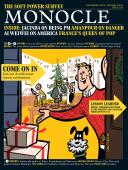
Issue 119
The holiday special. Inside: Jacinda on being PM, Amanpour on danger, Ai Weiwei on America, France’s queen of pop. Plus, our ninth annual Soft Power Survey.
In This Issue
Oops! No content was found.
Looks like we no longer have content for the page you're on. Perhaps try a search?
Return Home

